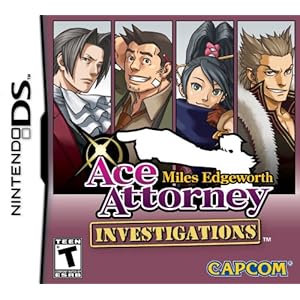
Imagine you're in some crime show, like Bones or Monk. Now, instead of watching and saying afterwards, "I knew it all along," you must actually prove your ability to predict the solution to crazy murder mysteries. That's Ace Attorney: Miles Edgeworth. Gameplay is limited to investigation (finding evidence and linking information with "logic") and interaction with witness/suspect testimony.
Superficial reactions: I've never played any of the other Ace Attorney games, but this one had a satisfying intertwining of initially disparate "chapters" of play. The script and character animations are fairly hilarious, though the distinctive music for each situation/character gets old by the end. Most of the time the obstacle is not figuring out what happened but figuring out how to tell the game that. For example, in order to use a piece of evidence that contradicts the witness's testimony, you must present it at exactly the right part of his testimony. It's remarkable that it works as well as it does, but it's frustrating when it's not as intuitive, as "dying" consists of replaying everything since your last save (booo-ring).
Controls: You can point and click with the stylus, but you can actually play the entire game without ever using the stylus. It's difficult to decide which is more desirable; buttons are more game-feeling but less precise when you want to point to that part of the screen, but using the stylus for a long time feels kind of weird. Oh, and you can use the "B" button to fast-forward through some text you've already seen.
Recommendations: I enjoyed the game more when I started playing in 30-60 minutes chunks. If like me, you play for 5-10 minutes and then pick it up again in a week, it's going to be frustrating to remember what's going on (although the game does provide useful hints as you flounder).
Cultural context: There is a lot of Japanese legal system culture that comes out in this game. The bizarre obsession with "truth," evidence, and the 100% confession rate are all a part of it. This NYTimes article sheds some light on the bad reputation Ace Attorney's prosecutors have. It claims that "Japanese authorities have long relied on confessions to take suspects to court, instead of building cases based on solid evidence," which also explains Ace Attorney's obsession with evidence, to the extent of absurdity in some situations. The Japanese courts do not allow plea bargaining, which explains the odd confession rate. Go read the article, and these games will make so much more sense.